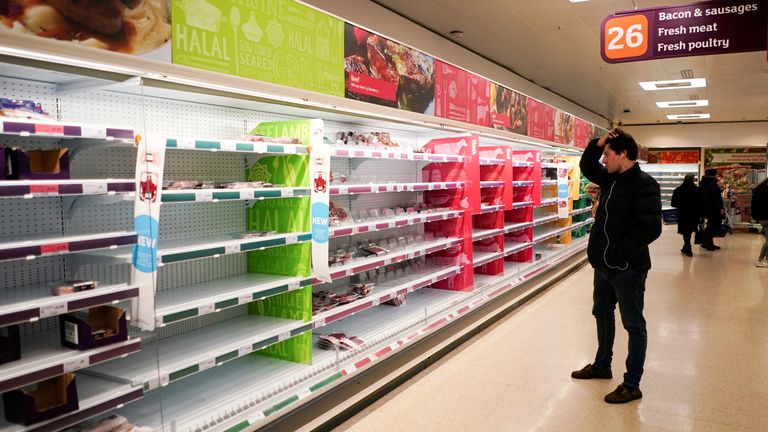The food industry has welcomed a deal to resume carbon dioxide production at two key UK sites – but warned there will still be supply shortages.
CF Industries agreed to restart activity at the fertiliser plants in Billingham on Teesside and Ince in Cheshire following talks with business secretary Kwasi Kwarteng.
The shutdown of the sites by the US firm last week, blamed on a surge in gas prices, had threatened a crisis in the food industry and piled pressure on ministers to act.
Image: CF Industries stopped work at its Billingham plant last weekThat is because CO2 – a by-product of the manufacturing process at the factories – plays a critical role in stunning poultry and pigs for slaughter and in vacuum packing.
Norwegian company Yara also said it was reducing production at ammonia factories across Europe, including one in Hull.
AdvertisementIt prompted warnings that shoppers could start noticing shortages in poultry, pork and bakery products within days.
The Food and Drink Federation, representing manufacturers, welcomed the deal to resume CO2 production though it said it not yet have the detail.
More from BusinessFDF chief executive Ian Wright said: “If production can restart at appropriate scale before the end of the week, this should be enough to ensure pig and poultry production can continue at close to normal.
“There will be some shortages, but these will not be as bad as previously feared.”
Image: Carbon dioxide is a key part of the meat production processThe deal came as the prime minister told Sky News the energy crisis was a “short-term problem” and said he did not think there would be disruption to food supplies at Christmas.
The gas price spike is also having a big impact on domestic energy suppliers – with two smaller players going out of business last week.
Sky News revealed on Tuesday that another firm, Green, had lined up insolvency advisers.
The government has made it clear that it will not offer bail-outs to those firms that go bust.
But the crisis could result in state-backed loans being offered to the larger suppliers, which will have to pick up the pieces by taking on their customers.
Buying gas on the wholesale market for all of those households affected – who could number in the millions – will prove costly at current inflated prices.
The related crisis in CO2 supply follows a previous shortage in 2018 – and the meat industry had voiced fears that the latest one could be worse.
It has said the product plays a “critical and irreplaceable role in the food and drink manufacturing process”.
The food industry has already been wrestling with other big supply chain challenges created by Brexit and the pandemic – including a shortage of 100,000 HGV drivers and a lack of workers in meat processing factories.
What’s behind the energy crunch – and why it’s hurting UK industry
Andrew Opie, director of food and sustainability at the British Retail Consortium, welcomed the announcement of a “deal to get CO2 production back to normal levels”.
“By taking decisive action on this important issue, the Government will help prevent availability issues arising from CO2 shortages,” Mr Opie said.
“It is vital that production at the Cheshire and Stockton-on-Tees plants is restarted as soon as possible, and distributed quickly to food manufacturers in need of it.
“To support this, and other supply chain issues that have arisen in recent weeks, the government must also find a solution to the shortage of HGV drivers.”
The British Meat Processors’ Association said it was meeting the government later but had not yet been given details of the deal and when production was planned to resume.
Richard Griffiths, chief executive of the British Poultry Council, also welcomed the move but said it was “waiting for Defra to facilitate how this will work in practice”.
“This is just the start of a long road ahead,” Mr Griffiths said.
“This episode has demonstrated the importance of CO2 in British poultry production, to avoid both bird welfare and supply issues.
“The whole poultry meat industry is working tirelessly to avoid food shortages or the worst case scenario of empty supermarket shelves.”
Zoe Davies, chief executive of the National Pig Association, said: “Obviously we are very relieved that a resolution has been found but still unsure at what cost – we don’t know the details of the deal that has been done yet, but hopefully it won’t resort in exorbitant CO2 prices (as we suspect it will).”
